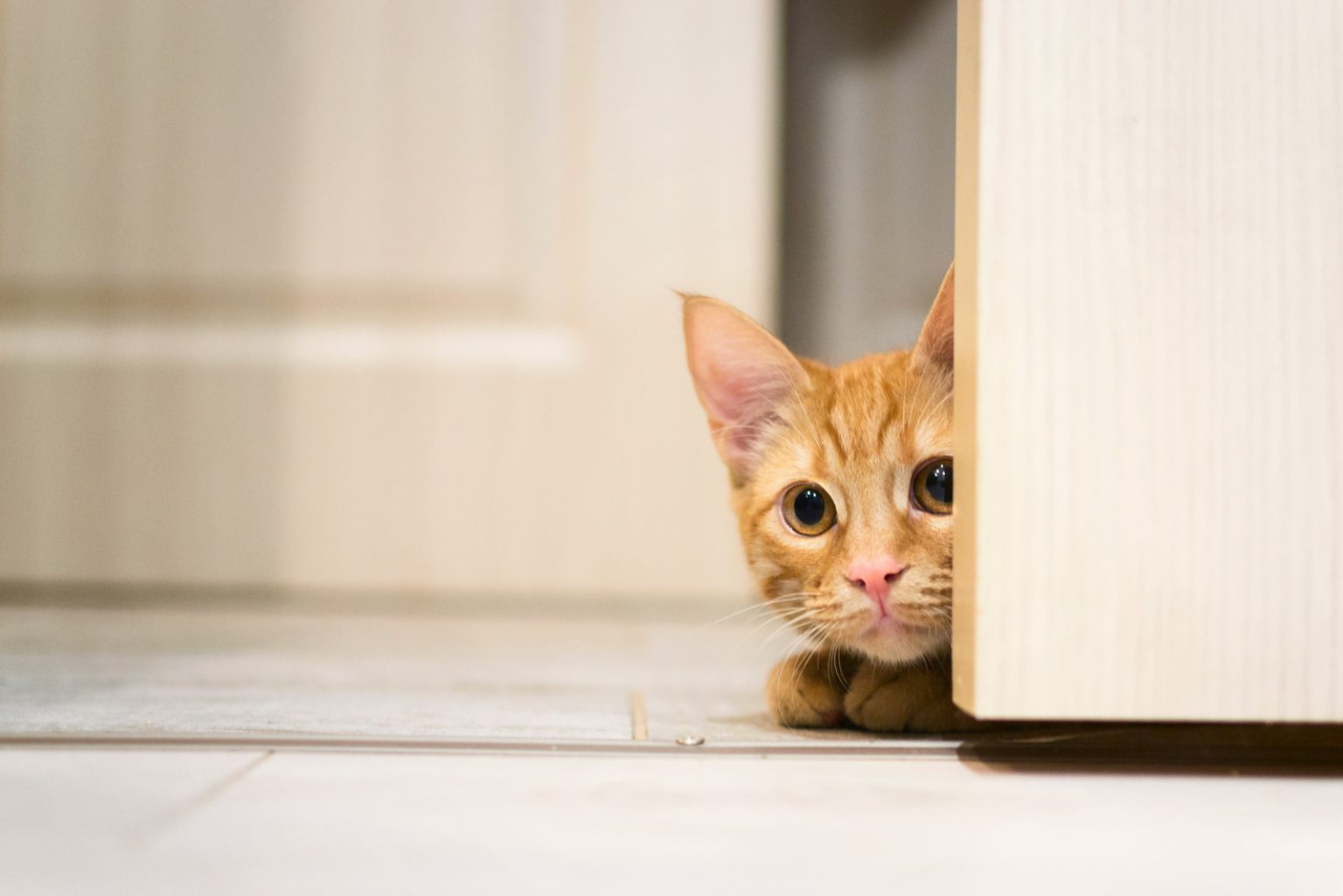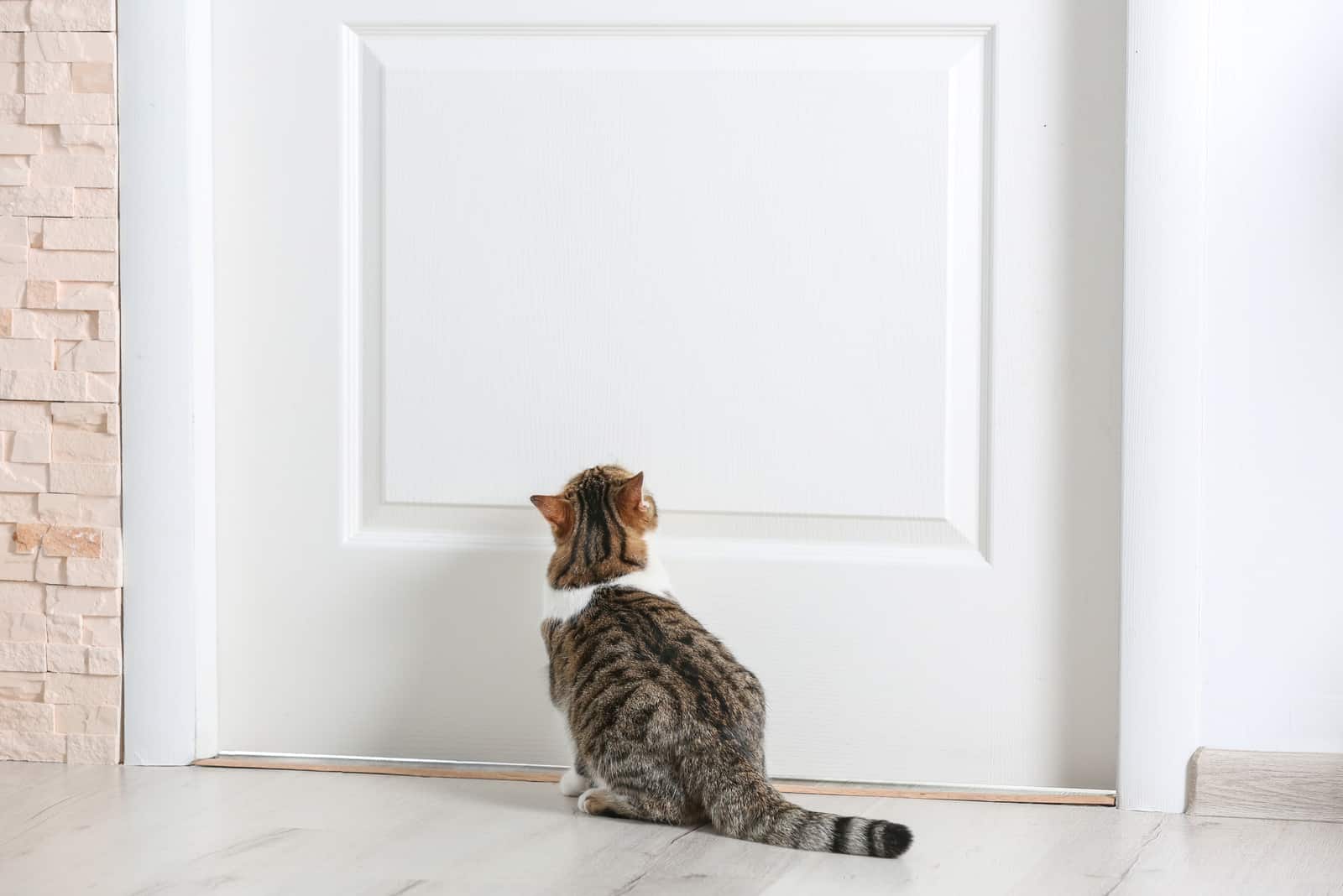Why Your Cat Sleeps Outside Your Bedroom Door

Your feline companion might choose to sleep outside your bedroom door for various reasons, driven by their instincts and need for security, comfort, and even a bit of attention.
Potential Behavioral Motivations, My cat sleeps outside my bedroom door
Cats are naturally drawn to warmth and security. They often seek out these elements in their environment, especially when sleeping. Sleeping outside your bedroom door might provide a source of warmth emanating from your room, especially if your bedroom is heated. Additionally, the door itself can offer a sense of security, creating a small, enclosed space that feels safe and protected.
Common Feline Behaviors and Instincts
- Territoriality: Cats are territorial creatures. They may be marking their territory by sleeping near your bedroom door, claiming it as their own space. This is particularly common if you have multiple cats in your household.
- Attention Seeking: Your cat may be trying to get your attention by sleeping near your bedroom door. They know you’ll likely be in your room at some point, and this strategic positioning allows them to be close to you and hopefully gain some interaction.
- Proximity to You: Cats are social creatures and crave companionship. While they may enjoy their independence, they also need a sense of connection to their humans. Sleeping outside your bedroom door allows them to be near you, even if they’re not in the same room.
Understanding Your Cat’s Sleep Habits

Cats are known for their love of sleep, spending an average of 12 to 16 hours a day dozing. But understanding their sleep patterns goes beyond simply knowing how much they sleep. It’s about understanding the stages of their sleep, the factors influencing their sleep choices, and how individual characteristics shape their slumber.
Stages of Sleep
Cats, like humans, experience different stages of sleep. These stages are characterized by varying brainwave activity and physiological changes.
- Non-Rapid Eye Movement (NREM) Sleep: This is the deepest stage of sleep, where the cat’s muscles relax, and their breathing slows down. It is divided into three stages:
- Stage 1: This is a light sleep stage, where the cat’s muscles are still relaxed, but their brain activity starts to slow down. They may twitch their whiskers or ears during this stage.
- Stage 2: The cat’s brain activity slows further, and their breathing becomes more regular. This is a deeper sleep stage than stage 1.
- Stage 3: This is the deepest stage of NREM sleep, where the cat’s brain activity is very slow, and their muscles are completely relaxed. This is the stage where most of their physical restoration takes place.
- Rapid Eye Movement (REM) Sleep: This is the stage of sleep where the cat’s brain is very active, and their eyes move rapidly under their eyelids. This is the stage where they dream. Their muscles are temporarily paralyzed during this stage, preventing them from acting out their dreams.
Cats spend a greater proportion of their sleep time in REM sleep than humans, suggesting that they experience more vivid and active dreams.
Environmental Factors
Cats are sensitive to their surroundings, and these factors can influence their choice of sleeping locations.
- Temperature: Cats prefer a comfortable temperature range for sleeping, typically between 70-85 degrees Fahrenheit. They may seek out warm spots like sunny patches or near heat sources in colder weather, or cooler spots like shaded areas or under furniture in warmer weather.
- Light: Cats are crepuscular animals, meaning they are most active during twilight hours. They tend to sleep more during the day, especially in bright light, and become more active at dusk and dawn. They may also prefer darker sleeping spots, especially in the daytime, to avoid bright light that can disrupt their sleep.
- Noise: Cats are sensitive to noise and can be easily startled by loud sounds. They may choose to sleep in quiet areas of the house, away from noisy appliances or traffic.
Individual Factors
A cat’s age, breed, and personality can also play a role in their sleep habits.
- Age: Kittens sleep much more than adult cats, often spending up to 20 hours a day sleeping. As cats age, they may sleep more, especially senior cats, who may experience changes in their sleep patterns due to health issues.
- Breed: Some cat breeds are known for being more energetic and active than others. For example, Siamese cats are known for being very vocal and playful, while Persian cats are known for being more laid-back and relaxed. These differences in personality can influence their sleep habits.
- Personality: Some cats are naturally more independent and prefer to sleep alone, while others are more social and enjoy sleeping near their owners. Cats with a more anxious or fearful personality may also sleep more to cope with stress.
Addressing Potential Concerns: My Cat Sleeps Outside My Bedroom Door

While it’s common for cats to choose their own sleeping spots, a sudden change in their sleeping habits, like consistently sleeping outside your bedroom door, could indicate an underlying issue. It’s important to be aware of potential health concerns and consider whether your cat’s behavior might be related to a medical condition or simply a preference.
Determining the Cause of the Behavior
Understanding the potential reasons behind your cat’s sleeping location is crucial. It can help you address any underlying issues and provide a more comfortable environment for your feline friend.
- Medical Conditions: Some medical conditions can cause discomfort or anxiety, leading cats to seek out different sleeping spots. For instance, arthritis or other joint pain might make it difficult for your cat to sleep comfortably in their usual bed. Similarly, a urinary tract infection could cause frequent urination, making them prefer a spot away from their litter box.
- Anxiety or Stress: Changes in your home environment, such as a new pet, renovation, or a move, can trigger anxiety in cats. They might seek out a secluded spot, like outside your bedroom door, to feel safe and secure.
- Environmental Factors: Your cat might prefer sleeping outside your bedroom door due to factors like temperature, noise, or light. For example, if your bedroom is too warm or cold, they might choose a cooler or warmer spot.
Seeking Veterinary Advice
If you’re concerned about your cat’s sleeping habits, it’s always best to consult your veterinarian. They can help determine if there’s an underlying medical condition and provide guidance on addressing any potential issues.
- Observe Your Cat’s Behavior: Pay attention to any other changes in your cat’s behavior, such as changes in appetite, energy levels, or litter box habits. This information can be helpful in diagnosing any underlying medical conditions.
- Provide a Detailed History: When you visit your veterinarian, provide a detailed history of your cat’s sleeping habits, including any recent changes or other relevant information. This will help your veterinarian make an informed diagnosis.
- Discuss Treatment Options: Your veterinarian can discuss potential treatment options, including medication, behavioral therapy, or environmental modifications, based on the underlying cause of your cat’s behavior.
